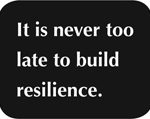Two brothers, close in age, had the same difficult childhood. They experienced physical and sexual abuse and lived in violent neighborhoods. Both their parents struggled with alcohol and spent time in jail.
Today, one brother is a thriving businessman who is happily married, a good father, and a valued member of his community. The other is chronically unemployed and fighting ongoing battles with substance misuse, depression, poverty, and poor health.
As resource parents and child welfare professionals, we all want young people in foster care to lead lives that turn out like the first brother, not the second.
We know there is no guarantee. We have no control over what happens to children before  they come into our care, or when they leave. Sometimes the trauma and adversity they have faced can make their odds of living a productive, happy, healthy life seem very, very long.
they come into our care, or when they leave. Sometimes the trauma and adversity they have faced can make their odds of living a productive, happy, healthy life seem very, very long.
But we have reason to hope. Advances in research have given us a much better understanding of resilience, the skill the first brother clearly has—the ability to adapt and do well despite serious hardships.
For example, one of the things we know is that the capabilities that underlie resilience can be strengthened at any age. It is never too late to build resilience.
Indeed, resource parents are well positioned to help children: research shows the most common trait shared by resilient children is a stable, committed relationship with at least one supportive parent, caregiver, or other adult.
We hope the information and encouragement in this issue of Fostering Perspectives will help you help children and youth in foster care develop the skills they need to manage stress, cope with adversity, and grow up to lead their best possible lives.
Click here to read the rest of this issue.


